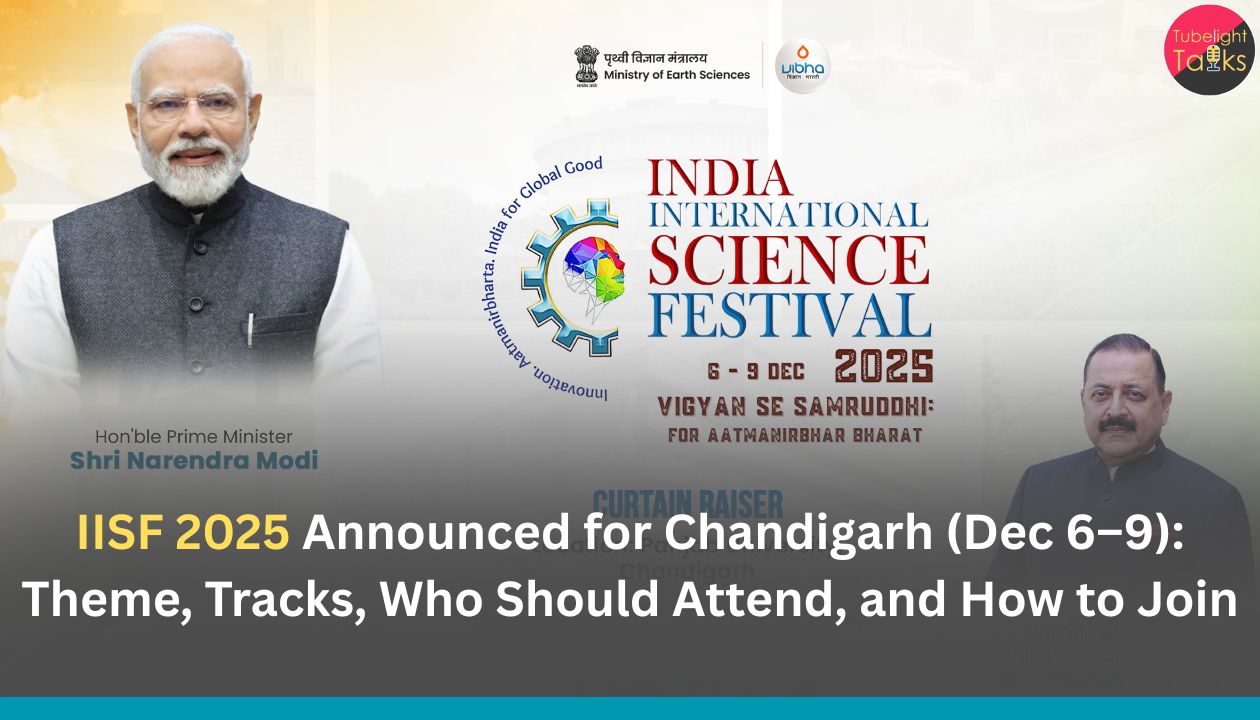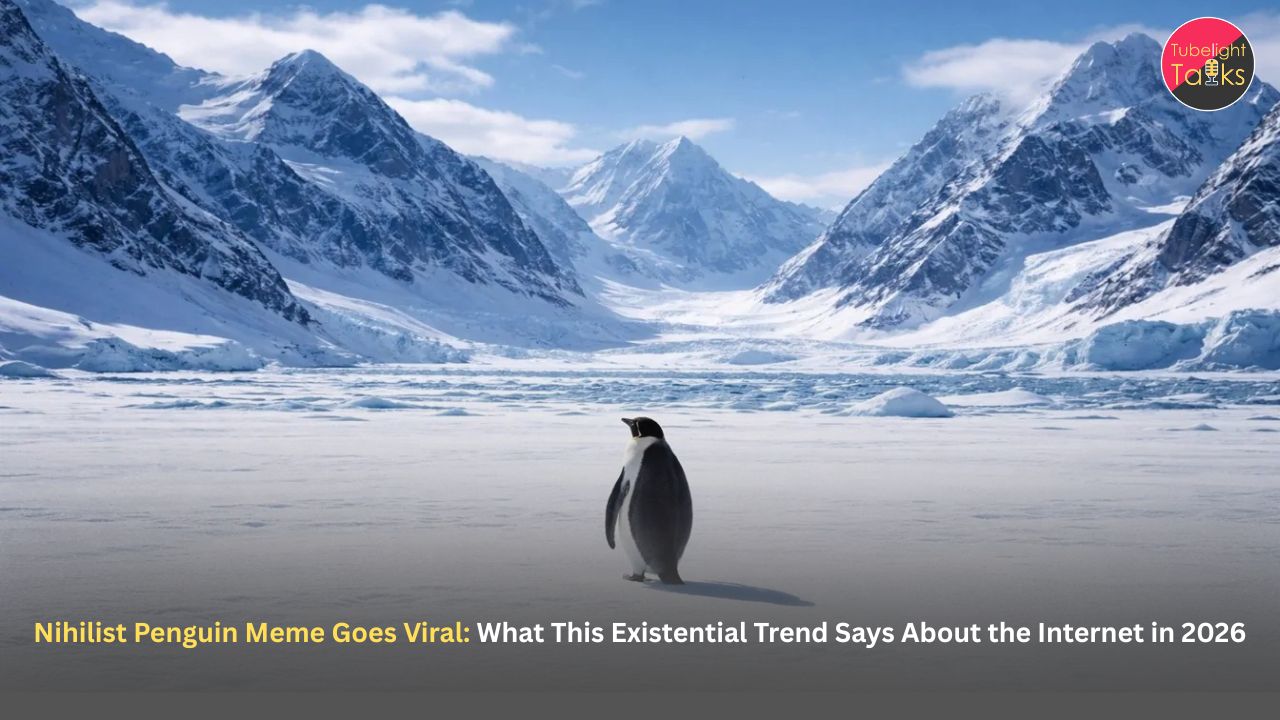IISF 2025 Announced for Chandigarh: India’s annual India International Science Festival (IISF) returns December 6–9, 2025 to Panjab University, Chandigarh, with the theme “Vigyan Se Samruddhi: for Aatmanirbhar Bharat”—science for prosperity and self-reliance. Led by the Ministry of Earth Sciences (MoES) with support from core science ministries and premier institutions, the festival will convene scientists, innovators, students, educators, startups, and the public to engage with frontier research and its societal applications.
What’s Official: Dates, Venue, Theme, and Who’s Behind It
- When: December 6–9, 2025 (four days).
- Where: Panjab University, Chandigarh.
- Theme: “Vigyan Se Samruddhi: for Aatmanirbhar Bharat.”
- Led by: Ministry of Earth Sciences (MoES); jointly organized with key S&T departments (DST, DBT, CSIR, Department of Space, Department of Atomic Energy) and host/partners including Panjab University and regional authorities.
The government’s official releases describe IISF 2025 as a platform to showcase scientific achievements, inspire young minds, promote science-led entrepreneurship, and forge collaborations for national priorities—echoing India’s emphasis on science-led governance and innovation for development.
The Minister’s Signal (with X link)
Highlighting the festival’s ethos, Union MoS (I/C) Science & Technology and Earth Sciences Dr Jitendra Singh has been posting updates and remarks around IISF 2025—stressing that science translates to prosperity and contributes to an Aatmanirbhar (self-reliant) India. For the social media context and visuals from his feed, see his post here:
What to Expect at IISF 2025: Themes and Tracks
The IISF website lists a broad set of thematic events that map to India’s priority technologies, science communication efforts, and public engagement goals. A non-exhaustive selection (as displayed on the official site):
Frontier S&T and National Missions
AI & AGI, Quantum, Semiconductors, Emerging Telecom, UAVs
Deep-tech tracks reflect the government’s push on AI/AGI, quantum technologies, semiconductor technologies, 6G/advanced telecom, and unmanned aerial vehicles—areas crucial to productivity, security, and new industries.
New Space Technology & Science–Technology–Defence–Space Exhibition
Expect space-tech showcases and a mega exhibition linking science, defence and space, highlighting India’s growing new space ecosystem and public programmes. (The expo page is flagged “to be updated soon,” but the exhibition category is listed.)
Clean Energy, Circular Economy, Bioeconomy
Tracks spanning clean energy, circular economy, and the bioeconomy align with sustainability, green manufacturing, and value addition from bio-based innovations.
Blue Economy & Himalayas in a Changing Climate
Ocean sciences and climate resilience come into focus under Blue Economy and Himalayas tracks—strategic for coastal livelihoods, disaster risk reduction, glacier science and water security.
People, Participation, and the Next Generation
Face-to-Face Student–Scientist Interaction & Students’ S&T Village (“The New Nalanda”)
Direct interactions and village-style learning hubs aim to demystify science for school and college learners and seed research curiosity early.
Educators & Teachers Workshop (“The Gurukula”) and Science Literature Festival (Vigyanika)
Pedagogy and science communication get dedicated spaces—teacher development and Vigyanika (the literature festival) promote storytelling, clarity and critical thinking around science.
Nari Shakti & Young Scientists’ Conclave
Focused platforms for women in STEM and emerging researchers foreground representation, peer networks, and career pathways.
Innovation, Startups and Diplomacy
Hackathon, Startup Journeys
Entrepreneurial sessions—hackathons and lived startup journeys—encourage problem-solving and translation from lab to market, dovetailing with India’s wider deep-tech agenda.
Ambassadors & Science Consulates Meet; Vision Sansad; Media Conclave
Science diplomacy, policy roundtables, and the media’s role in public trust-building indicate how IISF views science as a people’s project, not just a lab pursuit.
Registration, Schedule and On-Ground Logistics
The IISF 2025 website lists registration, schedule, and expo details as “to be updated” or “live shortly” (as of November 13, 2025, IST). Delegates typically include students, teachers, researchers, startups, industry and general visitors; watch the site for registration windows and event-specific sign-ups. PIB releases reiterate the Dec 6–9 dates and Panjab University venue.
Pro tip: If you’re traveling, plan for campus entry protocols, ID verification, and event badge pickup that are standard at IISF. Institutional delegations should pre-coordinate with the organising secretariat via the contacts listed on the site (iisf-2025@tropmet.res.in, +91 20 2590 4200).
Why IISF 2025 Matters: Five Big Reasons
1) Science for Prosperity, Not Just Papers
The theme “Vigyan Se Samruddhi” positions science as a driver of jobs, industry and public welfare—from clean energy and semiconductor fabs to precision agriculture and healthcare AI. IISF brings these threads together with students and citizens, aiming to convert curiosity into careers.
2) A National Showcase with Local Energy
Hosting IISF at Panjab University amplifies the north-west region’s science ecosystems and creates spillovers for Chandigarh’s institutions and startups. The curtain-raiser hosted in Chandigarh and subsequent regional events signal state–centre–university coordination.
3) Startups and Deep-Tech Get the Stage
Government messaging around IISF 2025 underscores an ecosystem where policy is increasingly science-led, with startups treated as core participants, not side shows—fitting India’s ambition in AI, quantum, space, and bioeconomy.
4) Public Trust in Science
PIB notes emphasize that trust grows when research is open, accessible, and reaches households in multiple languages. Tracks like Vigyanika, Science on Sphere, and Media Conclave target exactly that—explaining complexity plainly and inviting scrutiny.
5) Future-Ready Skills and Global Partnerships
From International Olympiad meets to ambassador–consulate dialogues, IISF 2025 blends skills pipelines with global collaboration—a capability approach rather than a one-off expo.
Official Confirmation: Curtain-Raisers and Ministry Briefings
- Curtain Raiser (Nov 8, 2025): PIB Delhi release confirming Dec 6–9 at Panjab University.
- Review Meetings (Nov 2, 2025): PIB outlined the festival’s goal to showcase a science-led, innovation-driven nation.
- Theme & Mission (Oct 17, 2025): PIB note flagged the “Vigyan Se Samruddhi” theme; core objectives match the current website.
- Official Website: IISF 2025 landing page, thematic event list, and organiser lineup.
Who Should Attend and Why
Students (School + UG/PG)
- Hands-on exposure to frontier tech (AI/AGI, quantum, semiconductors) and live demos.
- Student–scientist interactions can unlock internships, projects, and mentor networks.
Teachers and Educators
- The Gurukula workshops and Vigyanika help translate research into classroom practice and build assessment rubrics for inquiry-based learning.
Early-Career Researchers & Young Faculty
- Young Scientists Conclave for presenting work, peer feedback, and networking with industry and ministries.
Startups & Innovators
- Hackathons and Startup Journeys connect founders with policy shapers, labs and potential customers; the mega expo aids B2B visibility.
Citizens & Hobbyists
- Science on Sphere, Science Safari, Blue Economy and climate tracks make complex topics tangible—great for families and science clubs.
City & Campus: Chandigarh’s Advantage
Chandigarh combines premier institutions, urban planning, and good connectivity, giving IISF participants easy access to labs and cultural sites. With Panjab University as host, expect a campus conducive to large-format exhibitions and parallel tracks. Official posts from MoES and the IISF site highlight the city’s science ecosystem fit.
A Values Lens: Science that Serves People
A science festival is not just about dazzling prototypes—it’s a reminder that knowledge should serve people. Many spiritual discourses emphasise living truthfully, avoiding harm, and serving others. When applied to research and innovation, those same virtues translate into honest data, safe-by-design technologies, and equity in access—from clean energy and healthcare AI to climate resilience for vulnerable communities.
For readers exploring this perspective more deeply, see teachings and talks from Sant Rampal Ji Maharaj on aligning conduct with scripture and practising compassion in everyday work
Read Also: India International Science Festival 2025: Igniting Innovation for a Developed India
FAQs: IISF 2025 Announced for Chandigarh
1) What are the official dates and venue for IISF 2025?
December 6–9, 2025 at Panjab University, Chandigarh. Confirmed via PIB and the IISF 2025 website.
2) What’s this year’s theme?
“Vigyan Se Samruddhi: for Aatmanirbhar Bharat” (Science to Prosperity for a Self-Reliant India).
3) Who is organising IISF 2025?
Led by MoES, jointly with key S&T ministries/agencies (DST, DBT, CSIR, Department of Space, Department of Atomic Energy) and the host Panjab University.
4) Where can I see the list of tracks?
The Thematic Events section on the official site lists tracks such as AI & AGI, Quantum, Semiconductors, Blue Economy, Clean Energy, Hackathon, Startup Journeys, Vigyanika, Nari Shakti, Young Scientists Conclave, and more.
5) How do I register?
Registration is managed through the IISF website. As of Nov 13, 2025, the site notes registration and detailed schedule will be live/updated shortly—keep checking for forms and deadlines.










